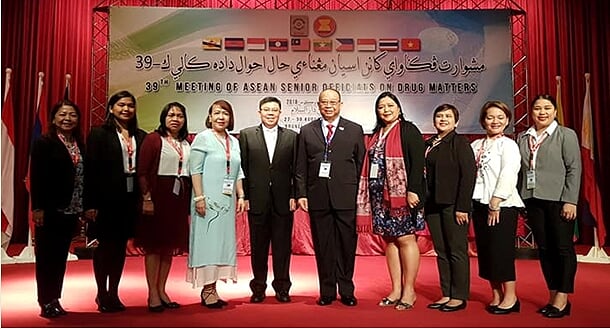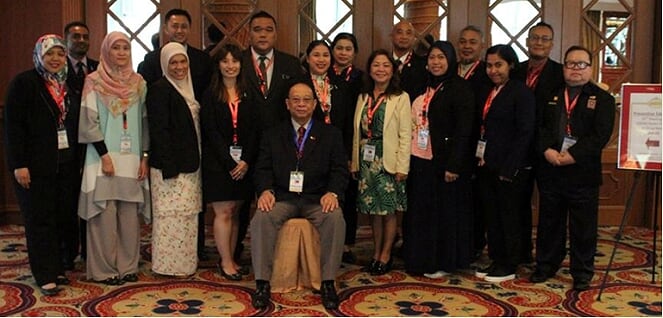The ASEAN Training Center for Preventive Drug Education (ATCPDE), through its Director, Prof. Francis Grace H. Duka-Pante, joined the Philippine delegation to the 39th Meeting of ASEAN Senior Officials on Drug Matters (ASOD) in Brunei, Darussalam on August 27-30, 2018.

The 9-member Philippine delegation was headed by Dangerous Drugs Board Assistant Secretary Walter P. Besas, Deputy Executive Director for Administration. The other delegates from DDB were Assistant Secretary Maria Belen Angelita V. Matibag, Deputy Executive Director for Operations; Ms. Rebecca Arambulo (OIC-Chief, Policy, Research and Statistics Division), Ms. Teresita C. Pineda (Chief, Preventive Education, Training and Information Division), and Ms. Doris Remedios Dorigo (Chief of Staff, Office of the DDB Chairman). Delegates from other government agencies were Director Maharani G. Tosoc (Acting Director, Plans and Operations Service, Philippine Drug Enforcement Agency); Director Donelyn M. Memedez (Acting Director, Preventive Education and Community Information Service, Philippine Drug Enforcement Agency); and Dr. Clara H. Fuderanan (Head, Capability-building Unit, Dangerous Drugs Abuse Prevention and Treatment Program, Department of Health).
The annual ASOD meeting aims to consolidate and strengthen collaborative efforts in the prevention and control of the drug problem in the region, share relevant information of common concerns and provide updates on progress made in the implementation of programs in order to realize the goals and targets set in the ASEAN Work Plan on Securing Communities Against Illicit Drugs 2016-2025.
The ASEAN working group sessions convened during the first day. The five working groups were: Preventive Education (chaired by the Philippines); Treatment and Rehabilitation (Malaysia); Law Enforcement (Thailand); Research (Singapore) and Alternative Development (Myanmar).
Seven AMS were represented in the Preventive Education Working Group namely, Brunei Darussalam (Ms. Siti Norhadinah Haji Marsal, Mr. Mohamed Fairuz Haji Sulong, Mrs. Dk Soffia @ Nurqalbi Pg Haji Soffian, Mr Haji Zulhamaizi Bin Haji Hamid, Mr. Mohd Saifulazli Abdullah, Mr. Wasli Haji Tuah, and Mrs. Wasulhana Haji Sudin); Cambodia (Police Lieutenant General Mr Neak Yuthea); Indonesia (Mrs. Eva Fitri Yuanita, Mrs. Yulia Angelina, and Mr. Catur Hadianto); Malaysia (Mr. Nazir Bin Mohamad, and Mohd Farid Bin Mohamad Japeri); Philippines (Asec. Walter Besas, Prof. Francis Grace H. Duka-Pante, and Ms. Teresita C. Pineda); Singapore (Ms. Wong Serene and Mr. Sivaraman); and Thailand (Ms Supodjanee Chutidamrong).
Asec. Besas from the Philippines chaired the meeting and served as the rapporteur while delegates from Singapore volunteered as the Secretariat.
All AMSs present agreed that the following recommendations from 38th ASOD meeting were achieved:
- Disseminate customized anti-drug campaign messages appropriate for specific target settings.
- Continuously share best practices and relevant information on Preventive Drug Education utilizing various mechanisms such as new media.
- Encourage prevention practitioners to continuously update and enhance their knowledge and capacities on evidence-based substance use prevention interventions through trainings and certification.
- Further strengthen AMSS support to the ASEAN Training Center for Preventive Drug Education (ATCPDE) through data provision in research projects and engagement in capacity-building activities.

On best practices in prevention, Brunei Darussalam shared piloting a newly adapted animation (Ali and Aliyah) for Year 5 primary school students, 'Pewira', a new tool to guide and educate identified high-risk secondary school students aged 7-11, workplace program targeted to private and government agencies, and NCB's logo and slogan competition. Meanwhile, Cambodia highlighted that all its ministries established drug prevention committees and trained respective focal points. For Indonesia, in cooperation with the Ministry of Interior, the BNN compiled a book on community leaders in the village environment, entitled "Watch out, drugs enter the village". They also used the internet and web portals in prevention; and conducted training for workers. Indonesia has also been attending training conducted by ATCPDE and conducted anti-drug resilience surveys for adolescents in collaboration with the Islamic State University. It also conducted Anti-Drug Development Advocacy programs as well as anti-drug development program using streaming media to reach out to people, in addition to posters, videotron, game and campaign. Indonesia also shared on their center of social media monitoring. Other initiatives included ice breaking dance; radio show; Suara pagi (Good morning) project for the children; and using music and radio as a prevention approach. Similarly, the Philippines discussed its advocacy and capacity-building programs: youth development (such as the kids against drugs; storytelling competition for grade school students; stage play competition for high school students; Project STAND, where street artists shared anti-drug messages through painting; and music festival known as Rakrakan), parent education, drug-free workplace program, national drug education program, conduct of special events, use of information technology as well as social media, programs for overseas Filipinos workers and families, outreach program for the urban poor communities and enhanced partnerships between public and private sectors and civil society. The Philippines also contributed in identifying challenges and proposing solutions in a PDE roundtable discussion conducted by UNODC on April 12-13, 2018. On the other hand, Singapore shared its PDE and engagement efforts, particularly on Continuous Education and Building Advocacy. It also spearheaded the development of an ASEAN PDE Portal since February 2018 and encouraged all AMSs to contribute their PDE materials to the portal to facilitate sharing of best practices amongst the ASEAN PDE practitioners. It also encouraged prevention workers to sustain the use of the green and white ribbon as a symbol of prevention. Significantly, Thailand shared various prevention programmes that are school-based, workplace-based (including overseas Thai workers) and community-based PDE; as well as outreach program using mass media and infographics. The school-based prevention programs attempted to reach out to early childhood, primary school, secondary school, colleges and universities. Meanwhile, the workplace-based programs were carried out using labor volunteers. There were also special Thailand's community-based programs which strengthened and empowered communities in carrying out effective drug prevention efforts.
The Philippines also shared with the working group on UNODC's update of the International Standards on Drug Use Prevention (2015).
For the second part of the meeting, Prof. Francis Grace Duka-Pante, ATCPDE Director, updated the AMS on two major research projects of the Center: "Substance Use Prevention Policies and Programs among AMS" and the "Inventory of the IEC materials in Preventive Drug Education in the ASEAN Region". She further seek assistance from AMS in validating the baseline survey which included information on tobacco and alcohol use. She went through several checklists with present AMSs to provide inputs on some missing information. Prof. Duka-Pante reiterated that some of the common themes that emanated from the survey are life and skills-based approach; important role of religion; and prevention in a combination of settings and venues.
She also informed the body that 2019 will mark the 40th Anniversary of the ATCPDE, and warmly invited all AMSs to join in the anniversary celebration. She also thanked all AMS for contributing to the ATCPDE Bulletin 2018.
Comments were sought on the continuation of Training on the Universal Prevention Curriculum Courses (especially on Physiology and Pharmacology and Monitoring and Evaluation) and the following were raised as recommended areas of training:
- Development of Monitoring and Evaluation instruments
- Qualitative Evaluation Methods (Case study and appreciative inquiry)
- Development of Program Database
- Using Geographic Information System in Preventive Drug Education.
The body agreed that these are all needed by the AMS but the topic on "Development of Monitoring and Evaluation Instruments" must be prioritized.
Prof. Duka-Pante gave everyone a hard copy of the baseline survey and IEC inventory with the validation forms as well as the ATCPDE Newsletter for 2018.
The last part of the discussion was a brainstorming session on the next PDE steps that AMS will take. The working group came up with following recommendations:
- Develop standardized evidence-based PDE models and prevention tools for ASEAN.
- Sustain engagements and assistance in data provision and capacity building activities in support of ATCPDE.
- Leverage existing AMS' PDE online resources and social media platforms to share best practices and PDE messages. This would also support the design of PDE programs and activities of ATCPDE [e.g. Singapore (ASEAN PDE Portal), Indonesia (Live Streaming)].
- Adopt a more pervasive social media campaign (go 'green' instead of printing hardcopy materials).
- Greater engagement and collaboration with the community (including private sector and civil society partners) for better dissemination of PDE messages.
Before the end of the meeting, Ms. Pineda invited all the ASEAN member states to send their representatives to the Youth Conference in Manila, Philippines on December 5-7, 2018.
On the second day, the opening ceremonies was graced by the Minister of Defense II and Chairman of the National Security Committee of Brunei Darussalam Pehin Datu Lailaraja Major General (Rtd) Dato Paduka Seri Haji Awang Halbi bin Haji Mohd Yusof who shared Brunei's whole-of-government and whole-of-nation approach to overcome the challenges of drug and realize Brunei Vision 2035. Recognizing the crucial role of ASOD, he noted, "The ASOD platform serves many purposes for us in developing drug control strategies and work plans, establish and strengthen network, enhance cooperation not just among us but also with dialogue partners as well as in the sharing of information, intelligence and evidence-based practices and standards." After the program, the meeting proper started with the transfer of chairmanship from Viet Nam, to Brunei Darussalam followed by the statement of the head of delegations and presentation of country reports. In the afternoon, there was a discussion on the updates regarding the ASEAN Work Plan and outcomes of ASOD meetings. The last part was reports on completed and on-going projects. Prof. Duka-Pante reported the successful conduct on December 4-8, 2017 of the ASEAN Training on Monitoring and Evaluation of Preventive Drug Education Programs facilitated by the ATCPDE through the Japan-ASEAN Integration Fund (JAIF). She also shared a 5-minute video presentation of the training highlights.
The succeeding days were allotted for the internal review of the ASEAN Work Plan and engagement with dialogue partners and external parties. The closing ceremonies' highlight was the acceptance of Cambodia to host the 40th ASOD in 2019. (fdp/vmg/sep2018)
